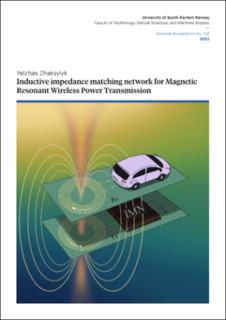| dc.contributor.author | Zhaksylyk, Yelzhas | |
| dc.date.accessioned | 2023-01-10T07:24:18Z | |
| dc.date.available | 2023-01-10T07:24:18Z | |
| dc.date.issued | 2023 | |
| dc.identifier.isbn | 978-82-7206-738-9 | |
| dc.identifier.issn | 2535-5252 | |
| dc.identifier.uri | https://hdl.handle.net/11250/3042130 | |
| dc.description.abstract | Inductive wireless power transfer is getting more and more attention as the demand for mobile electronic devices grows. There are already well-functioning wireless charging systems for smartphones, tablets, and electric toothbrushes. The main disadvantage of these systems is a degradation of power transfer effciency due to misalignment and distance variation between the charging station and the devices. This degradation limits the mobility of devices due to impedance mismatch in the system and
can be compensated by using proper impedance matching techniques.
Impedance matching (IM) is a technique used to optimize the power transfer from a source to a load, also applicable in wireless power transfer (WPT) systems. There are two main IM approaches, namely capacitive and inductive matching. Capacitive impedance matching network (IMN) is the main approach used in most WPT systems, and it is widely discussed in the literature. Inductive is less common, and therefore, only a few inductive matching techniques have been reported. This PhD project
aims to compare these two IMNs for use in WPT systems and, in addition, proposes new methods for inductive impedance matching.
Although the capacitive and inductive IMN are fundamentally different, we developed a method for comparing these and concluded that the
same level of matching could be achieved. This conclusion is proved analytically using circuit theory, simulation, and visualized on Smith charts.
This thesis proposes two new methods of tunable inductive IMN for use in magnetic resonance WPT. These methods offer an effcient driving and tuning of a resonating coil with a simple and compact design for easy and low-cost production. The study also compares the proposed approaches to the existing alternatives, such as using high-quality variable
capacitors (varactors) for actively tuning the system for optimal power transfer. | en_US |
| dc.language.iso | eng | en_US |
| dc.publisher | University of South-Eastern Norway | en_US |
| dc.relation.ispartofseries | Doctoral dissertations at the University of South-Eastern Norway;152 | |
| dc.relation.haspart | Article I: Y. Zhaksylyk and M. Azadmehr, "Comparative Analysis of Induc- tive and Capacitive Feeding of Magnetic Resonance Wireless Power Transfer," 2018 IEEE PELS Workshop on Emerging Technologies: Wireless Power Transfer (Wow), Montr eal, QC, 2018, pp. 1-5, doi: 10.1109/WoW.2018.8450891. (Omitted from online publication) | en_US |
| dc.relation.haspart | Article II: Y. Zhaksylyk, U. Hanke and M. Azadmehr, "Design of a switchable driving coil for Magnetic Resonance Wireless Power Transfer," 2019 IEEE PELS Workshop on Emerging Technologies: Wireless Power Transfer (WoW), London, United Kingdom, 2019, pp. 249-252, doi: 10.1109/WoW45936.2019.9030674. (Omitted from online publication) | en_US |
| dc.relation.haspart | Article III: Y. Zhaksylyk, E. Halvorsen, U. Hanke, and M. Azadmehr, "Anal- ysis of Fundamental Di erences between Capacitive and Inductive Impedance Matching for Inductive Wireless Power Transfer", Elec- tronics 2020, 9, 476, doi: 10.3390/electronics9030476 (Included) | en_US |
| dc.relation.haspart | Article IV: Y. Zhaksylyk, U. Hanke and M. Azadmehr, "Impedance Matching using Interspiraled Coils for Wireless Power Transfer," 2020 IEEE PELSWorkshop on Emerging Technologies: Wireless Power Trans- fer (WoW), Seoul, Korea, 2020, pp. 346-349, doi: 10.1109/ WoW47795.2020.9291325. (Omitted from online publication) | en_US |
| dc.relation.haspart | Article V: Y. Zhaksylyk, U. Hanke, and M. Azadmehr, "Single-side interspi- raled inductive impedance matching for Magnetic Resonance Wire- less Power Transfer", is submitted to IEEE Transactions on Cir- cuits and Systems I: Regular Papers. (Omitted from online publication) | en_US |
| dc.relation.uri | http://creativecommons.org/licenses/by-nc-sa/4.0/deed.en | |
| dc.subject | wireless power transfer | en_US |
| dc.subject | impendance matching | en_US |
| dc.title | Inductive impedance matching network for Magnetic Resonant Wireless Power Transmission | en_US |
| dc.type | Doctoral thesis | en_US |
| dc.description.version | publishedVersion | en_US |
| dc.rights.holder | © The Author, except otherwise stated | en_US |
| dc.source.pagenumber | 95 | en_US |
